Opposition chairman Benjamin Netanyahu said Friday he hopes Russian President Vladimir Putin is “having second thoughts” about his expansionist efforts, and revealed that he would consider supplying arms to Ukraine if he returns to office after Israel’s November 1 elections.
The comments appeared to mark a departure from the former prime minister’s long-held position that Israel should remain more neutral regarding Russia’s invasion of Ukraine, given Israel’s desire to maintain its freedom of movement to strike Iranian targets in Syria whose skies Moscow controls.
In July, he tore into the current government for creating a “dangerous crisis” with Russia after he had worked for years to develop a “measured, balanced and responsible relationship with the Kremlin.
In a Friday interview with USA Today, Netanyahu reiterated that point, saying that “Our air forces are flying side by side over the skies of Syria. [As prime minister], I wanted to assure the freedom of action of the Israeli Air Force to basically pummel Iran’s military positions that they tried to establish in Syria to open a second terror front against us. Thank God we’ve been successful in doing that.”
Netanyahu was then asked if he believes Putin is acting rationally as he expands Russian military operations in Ukraine.
Get The Times of Israel’s Daily Edition by email and never miss our top stories
“I think he’s guided by his vision of reconstituting a great Russian realm, and I hope he’s having second thoughts about it,” he responded.
“But I don’t want to play psychologist. I want to be in the position of being prime minister, getting all the information, then making decisions on what and if we do anything in this conflict beyond what has been done so far,” he added.
Netanyahu then pointed out that the current government is being criticized for its refusal to supply weapons to Ukraine.
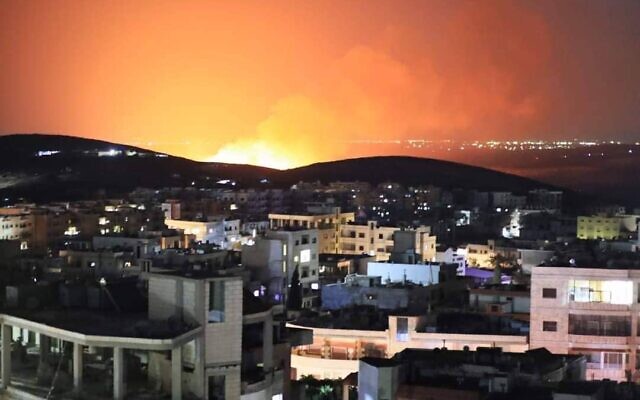
File: A fire is seen after an alleged airstrike near the Syrian city of Masyaf, on August 25, 2022. (Social media)
“I was asked about that recently, and I said I’ll look into it when I get into office,” the opposition chairman said, appearing to go further in his willingness to practically support Ukraine than ever before. “We all have sympathy for Ukraine. It’s not even a question, and I’m no different.”
Netanyahu also revealed that he was asked to mediate between Russia and Ukraine after the war broke out.
“I said, ‘Well, I think I’ll leave that to the sitting prime minister to decide.”
Then-prime minister Naftali Bennett would go on to mediate between Putin and Ukraine President Volodymyr Zelensky, traveling to Moscow and holding a handful of phone calls with both leaders.
However, his effort never ended up bearing fruit and he put the matter aside after several months as his government began to fall apart.
Netanyahu, who in the past has boasted of his close ties with Putin, said Friday that the mediation offer “presumably would come up again” if he is returned to power.
The Likud chairman is seen as having a very realistic shot at returning to office in the November 1 election.
The position Netanyahu offered on Friday also appeared to be a softened version of comments made two days earlier when asked about the possibility of arming Ukraine.
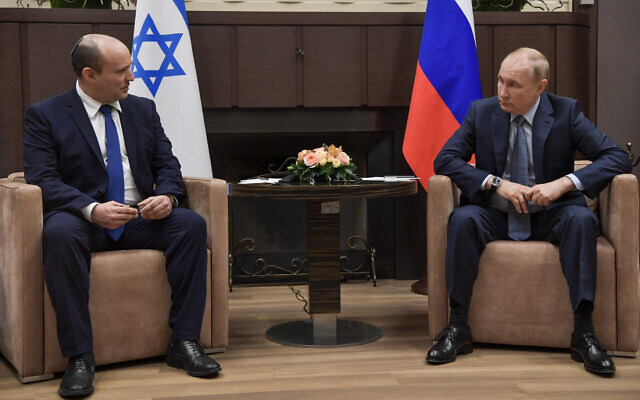
File: Prime Minister Naftali Bennett (left) meets with Russian President Vladimir Putin in Moscow, Russia, on October 22, 2021. (Kobi Gideon/GPO)
During a Wednesday interview with MSNBC, Netanyahu said that “time and again…weapons that we supplied in one battlefield end up in Iranian hands used against us.”
The former prime minister cited an incident on the Syrian side of the Golan Heights in which the IDF “encountered Israeli-made weapons” in a place “where we are trying to prevent Iran from opening a second Lebanon front, a second terrorist front against us.”
Netanyahu may have been alluding to a 2016 incident in which drone technology originally sold to Russia was then sold to the Iranian military, who deployed the Russian-manufactured drone against Israel.
Ironically, the Israeli Air Force reportedly failed to down the drone with two Patriot missiles, instead calling on Russian Air Force capabilities to down the aerial vehicle.
In the TV interview, Netanyahu offered rare support for the current government, highlighting its “pragmatic” stance vis-à-vis Ukraine.
Earlier that day, The New York Times reported that Russia has drawn downforces in Syria and removed the sophisticated S-300 anti-aircraft system that has been a major threat to Israeli Air Force operations in the country.
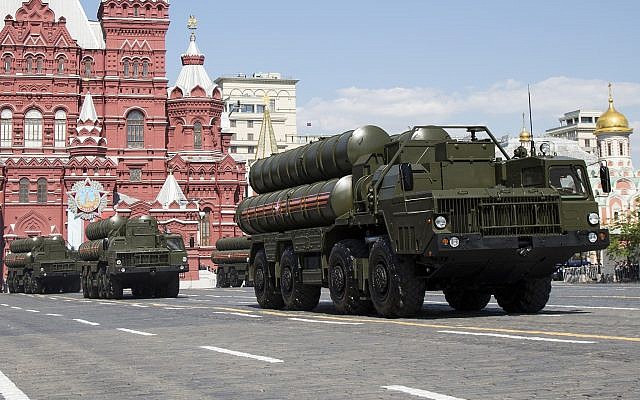
Russian S-300 air defense missile systems drive during the Victory Day military parade marking 71 years after the victory in WWII in Red Square in Moscow, Russia, on May 9, 2016. (AP Photo/Alexander Zemlianichenko, File)
The development could open the door for Jerusalem to upgrade its level of support for Kyiv, as Russia’s presence in Syria has been a major consideration for Israel’s position on the matter.
A senior Israeli defense official and two senior Western diplomats told The Times that the redeployment would decrease Russian leverage on Israel and that this may lead Jerusalem to reconsider its support for Ukraine.
The Israeli position is believed to be based on its desire to maintain freedom of operations in Syria as well as to avoid causing problems for Russia’s large Jewish community. Israel is also concerned that as Russia pulls out its military presence in Syria, Iran will be able to increase its influence.
Moscow has already moved to curb Jewish institutions in the country: Over the summer, Russia’s Justice Ministry filed a petition to liquidate the Russian offices of the Jewish Agency for Israel — a semi-governmental organization that encourages and facilitates Jewish immigration — in what analysts view as a reaction to Israel’s criticism of the invasion.
On Wednesday Defense Minister Benny Gantz stressed that while Israel will continue its support for Ukraine over the invasion, “it will not deliver weapon systems to Ukraine, due to a variety of operational considerations.”
However, he said Jerusalem could supply an early-warning system to the beleaguered nation to warn of incoming strikes, like the one used in Israel.
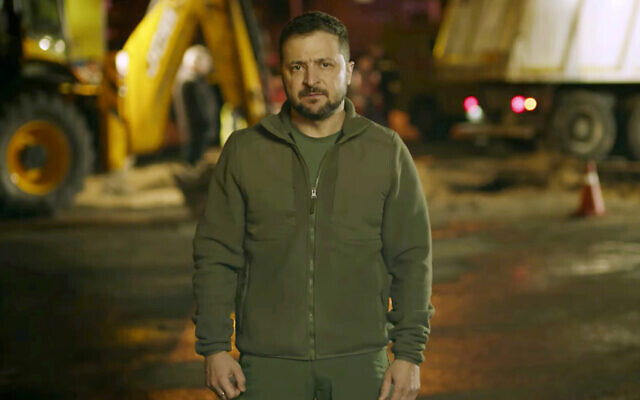
In this image from video provided by the Ukrainian Presidential Press Office, Ukrainian President Volodymyr Zelenskyy speaks in Kyiv, Ukraine, October 10, 2022. (Ukrainian Presidential Press Office via AP)
On Thursday, Prime Minister Yair Lapid spoke with Ukrainian Foreign Minister Dmytro Kuleba amid anger in Kyiv over Israel’s refusal to supply arms to Ukraine as it battles Russia’s invasion.
After the phone discussion, Lapid tweeted that Kuleba updated him on the war, while the prime minister said he “shared with him [Kuleba] our deep concern about the military ties between Iran and Russia,” affirming that “Israel stands with the Ukrainian people.”
However, Lapid made no mention of Ukraine’s formal request that Israel supply Ukraine with air defense systems in the wake of the barrage of Russian strikes in recent days, many believed carried out with Iranian-supplied drones.
On Monday, Dmitri Medvedev, the deputy head of the Russian Security Council, warned Israel in a social media post that any “reckless” supply of military equipment to Ukraine “will destroy all interstate relations between our countries.”
Israel has in the past provided humanitarian aid to Ukraine, including operating a field hospital for several weeks in the early days of the conflict, and also protective military equipment such as helmets and flak jackets. More recently, however, it has also provided the Ukrainians with intelligence about Iranian drones, according to Ukrainian and Israeli officials, who say that Israel has also offered to examine the remains of drones that crashed.



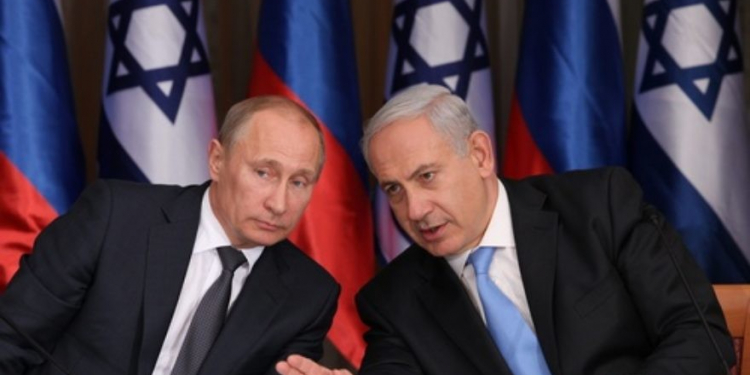


























Discussion about this post